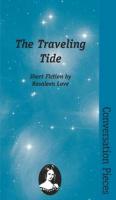"GoGo"
"Once Giants Roamed the Earth"
The Traveling Tide, by Rosaleen Love, is the fifth volume in Aqueduct Press’s “Conversation Pieces” series. The stated goal of the series is to “document and facilitate the grand conversation of feminist sf.” This installment contains four stories, two articles, and the emailed progress reports Love sent home while traveling with her cousin, Bridie, through the American South.
The first story, “Alexander’s Feats” paints a picture of Alexander the Great as mad scientist. The first section recounts Alexander’s attempt to bestow eternal youth on his wife, Roxanne. The second section tells of Alexander inventing the bathyscape and conquering the Caspian Sea. The final section focuses more on Roxanne and how she invents interstellar travel and shares the secret with Alexander.
“Alexander’s Feats” reminds me of reading a collection of tall tales. Love successfully suggests the mythic proportions of Alexander, but manages, in the form of Roxanne, to hint that the emperor may be without some of his clothes. The portrayal of Alexander is not malicious. He isn’t wicked or a fool, just less of a god than we have been led to believe.
The next story, “In the Shadow of the Stones,” is the story of Queenie. She is distressed because her friends are disappearing one by one. Queenie tries to figure out a pattern between the disappearances, though they vanish from different places.
“In the Shadow of the Stones” is not as easy to follow as “Alexander’s Feats.” Most of the time, I felt as though the story was written in code and I was not clever enough to figure out the key. But at the story’s end, the key is revealed and there is that moment of realization that makes the rest fall into place with a satisfying snap.
“GoGo” is a mishmash of a fish’s political stumping for a dead end evolutionary track, geology, history, and anecdote, all with an undercurrent of environmentalism. The plot is ephemeral and the characters inconsequential. The story’s message was a powerful one, so powerful that it overwhelmed the other elements. Though amusing, and even enlightening, this story did not sufficiently pull together to form a cohesive whole.
The final story, “Once Giants Roamed the Earth,” is the collection’s most absorbing piece. It has a lush aboriginal tone that weaves a spell of myth and folktale. It is a tale of the sea turning into land and a god who lays down to sleep on the horizon. And Maika, the power goddess that is a force of nature, who cares nothing for laws, government, or boundaries.
“Once Giants Roamed the Earth” is a tale of destruction and renewal. Maika is the personification of the Earth. She sweeps the land bare and throws it into upheaval. Love doesn’t leave it desolate, though. She shows us that after destruction there is peace and renewal, and hope is always a good way to end things.
Publisher: Aqueduct Press
Trade Paperback: $9.00
ISBN: 0974655996
Trade Paperback: $9.00
ISBN: 0974655996
